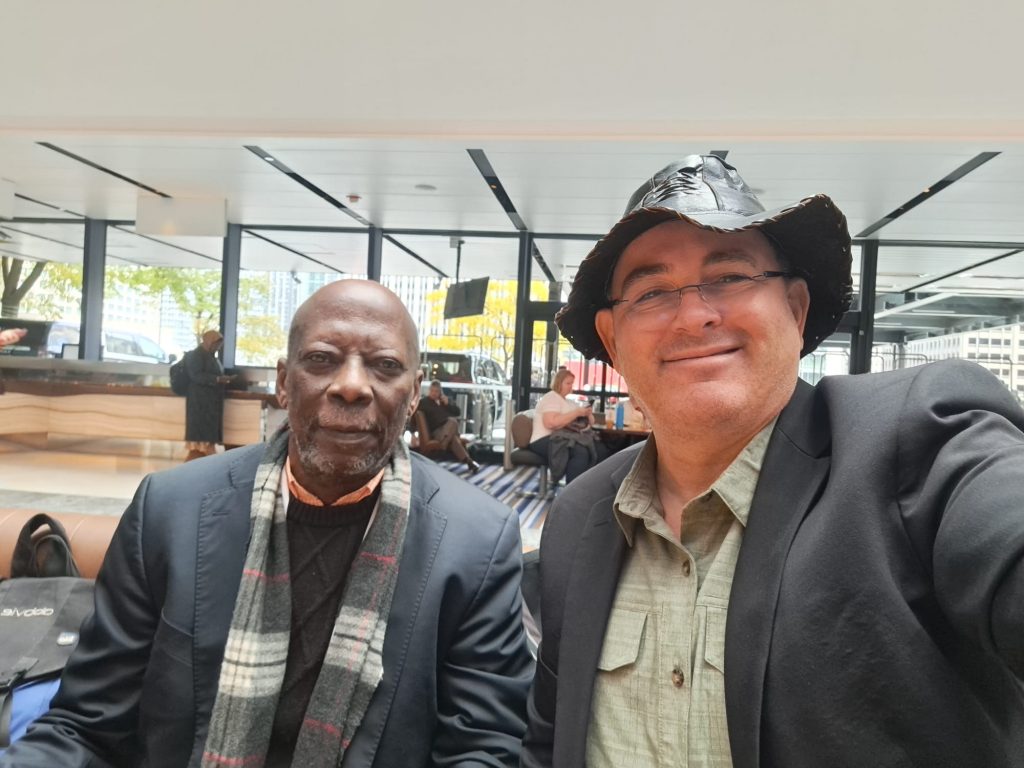
With an incredibly heavy heart, I reflect on the loss of my dear mentor, Professor (Prof) Michael David Wilson, Ph.D. of the Noguchi Memorial Institute for Medical Research at the University of Ghana. Prof. Wilson was not only one of the most respected figures in global parasitology, but he was also the embodiment of kindness, wisdom, and generosity.
My journey with Prof. Wilson began in 2013 when I met him during my Fogarty Global Health Fellowship. From the very start, his warmth and commitment were palpable. His welcoming nature—always inviting me for coffee or a chat in his office in Legon Campus in Accra—made me feel at home, even though I was an overseas visiting scientist. During my K01 IRSDA career development grant (2016-2021), he was my hosting mentor, guiding me through the complexities of global health research, specifically in parasitology and infectious diseases. He went out of his way to offer support and guidance, always trying to solve my challenges, especially during difficult times of securing research funding.
Prof. Wilson profoundly impacted tropical disease research globally with an impressive career spanning over 50 years. He dedicated his life to combating malaria, Buruli ulcer, schistosomiasis, lymphatic filariasis, hookworm, sickle cell disease, and many more. Furthermore, his work was not confined to the laboratory but extended into communities across West Africa and beyond, where his research directly impacted disease control and prevention efforts.
One example of his extraordinary accomplishments was his leadership in establishing the feasibility and development of the operational strategy to eliminate onchocerciasis transmission on the island of Bioko in Equatorial Guinea, a monumental task that showcased his brilliance as a scientist and a leader. His efforts in parasitology, from combating lymphatic filariasis to advancing the science of helminth infections, have saved countless lives and influenced the work of many global health professionals.
I fondly remember our last meeting at the American Society of Tropical Medicine and Hygiene (ASTMH) in Chicago in October 2023. We often shared lunches and dinners, discussing ways to secure funding and advance our collaboration. He was, as always, elegantly dressed in his traditional Ghanaian attire and, of course, always a gentleman, both in appearance and character. These shared moments are now treasured memories of a mentor who was more than just a professional guide; he was a friend.
Prof. Wilson’s presence commanded respect not just from his peers but also from his students, mentees, collaborators, and friends. He always had time to listen, offer advice, and provide mentorship with a genuine desire to see others succeed. His generosity of spirit, matched with his extraordinary intellect, made him irreplaceable in the global fight against infectious diseases.
I will miss our long conversations, his sharp insights, charm, and even the cigarette escapades we sometimes shared. He was a remarkable human being who dedicated his life to bettering the world, and I am eternally grateful for the time I spent learning from him. His legacy will continue to inspire all who had the privilege of knowing him.
Ghana, the global health community, and parasitology have lost a legendary icon. I have lost a mentor, a confidant, and a friend.
Rest in peace, Prof. Michael David Wilson. Your impact on this world is immeasurable, and your absence will be deeply felt. God bless you.
Scientific Collaboration with Prof. Michael Wilson: A Legacy of Research and Discovery
Throughout the years, I collaborated with Prof. Michael Wilson on numerous research projects that advanced our understanding of the intersections between malaria, sickle cell disease, and hemolytic disorders. Together, we explored how genetic and molecular factors influence disease outcomes, focusing on microRNAs, exosomal signaling, and inflammation. Prof. Wilson’s contributions to our work were invaluable, and his insights helped push the boundaries of tropical medicine and parasitology.
Here are some joint publications in recent years covering a wide range of critical topics:
Modulation of Heme-Induced Inflammation Using MicroRNA-Loaded Liposomes: In this recent publication, we investigated how microRNA-loaded liposomes could modulate heme-induced inflammation, offering potential therapeutic approaches for hemolytic disorders like malaria and sickle cell disease. Prof. Wilson’s expertise in parasitology and disease pathogenesis greatly enriched this work. https://doi.org/10.3390/ijms242316934. PMCID: PMC10707194.
Sickle Cell Hemoglobin Genotypes and Malaria Parasite Growth: This study examined the effect of sickle cell hemoglobin genotypes on malaria parasite growth, correlating it with exosomal miR-451a and let-7i-5p levels. Prof. Wilson played a key role in understanding the complex interplay between malaria and hemoglobinopathies. https://doi.org/10.3390/ijms24087546. PMCID: PMC10141851.
MicroRNA Profiles in Sickle Cell and Malaria Patients: We further explored the expression of miR-451a and let-7i-5p in individuals with different sickle cell genotypes and malaria, highlighting the critical role of exosomes in disease modulation. Prof. Wilson’s contributions were pivotal in clarifying this emerging field of study. https://doi.org/10.3390/jcm11030500. PMCID: PMC8837188.
Attenuating Heme-Induced Inflammation: Our work also demonstrated how extracellular vesicles (EVs) loaded with miR-451a and let-7i-5p could attenuate heme-induced inflammation in iPSC-derived endothelial cells, pointing towards novel anti-inflammatory strategies. https://doi.org/10.3389/fimmu.2022.1082414. PMCID: PMC9815029.
Clinical Presentations and Malaria Burden in Sickle Cell Patients: We examined the clinical presentations and malaria burden in sickle cell patients in Ghana. Prof. Wilson’s deep knowledge of the local healthcare landscape and parasitological expertise was essential in contextualizing our findings. https://doi.org/10.1016/j.eclinm.2021.101045. PMCID: PMC8342910.
Inflammatory Response to Plasmodium Infection: Another important study we collaborated on focused on how hemoglobin genotypes modulate the inflammatory response to Plasmodium infection. Prof. Wilson’s work in parasitic disease control helped shape our understanding of the genetic factors involved in malaria susceptibility. https://doi.org/10.3389/fimmu.2020.593546. PMCID: PMC7786007.
Hematological Differences among Malaria Patients in Ghana: In this study, we investigated hematological differences between malaria patients in rural and urban Ghana. Prof. Wilson provided critical insights into local epidemiological trends and disease control strategies. https://doi.org/10.1093/tropej/fmw038. PMCID: PMC5141942.
CXCL10 Polymorphisms and Malaria Susceptibility: We explored the association between CXCL10 gene polymorphisms and susceptibility to cerebral malaria. In this project, Prof. Wilson’s parasitology expertise and collaborative spirit were instrumental in uncovering genetic factors contributing to malaria pathogenesis. https://doi.org/10.1371/journal.pone.0081329. PMCID: PMC3857834.
Through these joint efforts, Prof. Wilson’s vast experience and mentorship not only advanced our scientific understanding but also significantly impacted the careers of those he worked with. His legacy will live on through our research, and his contributions will continue to inspire future scientists.
A Legacy Remembered
Our scientific achievements and discoveries are a testament to Prof. Michael Wilson’s brilliance, but they represent only a fraction of his impact on the world. His kindness, generosity, and unwavering support touched the lives of everyone he encountered. Whether through his mentorship, collaborations, or friendships, he always found ways to uplift those around him.
I extend my deepest condolences to his family, friends, colleagues, and everyone who had the privilege of meeting him. His loss is profound not only for the scientific community, global health, and parasitology but also for all of us who knew him as the remarkable human being he was. May his soul rest in peace, and may his legacy continue to inspire us all.

